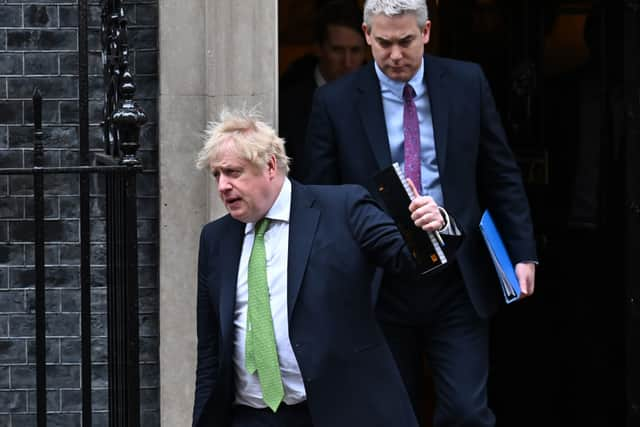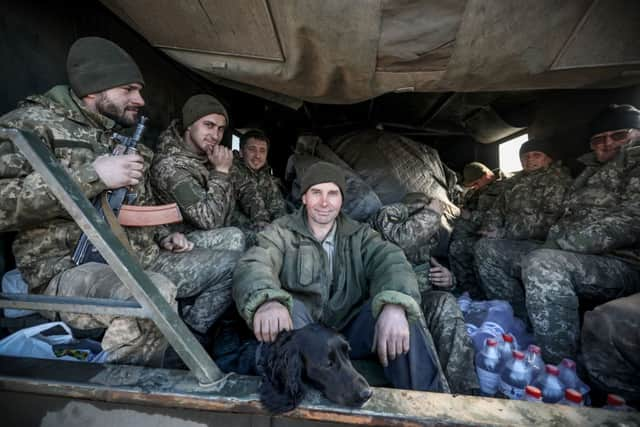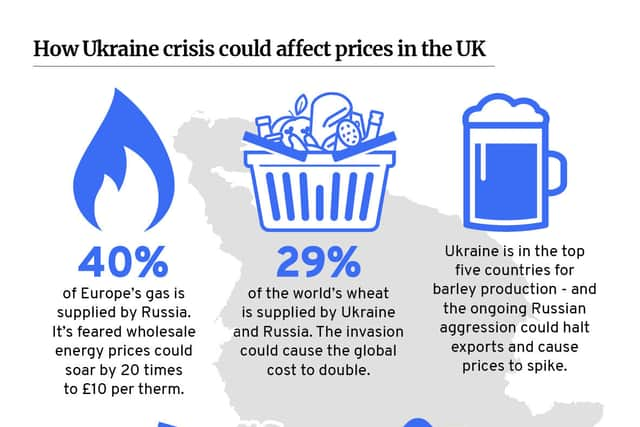Will UK go to war with Russia? Will Putin use nuclear weapons, NATO’s position - Ukraine conflict explained
This article contains affiliate links. We may earn a small commission on items purchased through this article, but that does not affect our editorial judgement.
and live on Freeview channel 276
With strong rhetoric from politicians and diplomats, headlines shouting for your attention from the newspapers and worrying imagery on the news, the situation in Ukraine has given many of us a pretty uneasy feeling.
The invasion of Ukraine many were fearing has begun, and has raged for a number of days now.
Advertisement
Hide AdAdvertisement
Hide AdOne of the latest key developments saw Vladimir Putin order Russia’s nuclear deterrent forces to be put on alert amid the conflict.
The Russian state-run TASS news agency reported that President Putin made the decision at a meeting with defence minister Sergei Shoigu and chief of the General Staff of the Armed Forces of Russia Valery Gerasimov.
The order was put in in response to “aggressive statements” from Nato countries - which includes the UK - so how worried should we be back home?
Here is everything you need to know.


How has the West responded?
Putin’s moves have been met with condemnation around the world, with many countries imposing sanctions on Russia in response.
Advertisement
Hide AdAdvertisement
Hide AdSanctions are a diplomatic tool to disadvantage countries in ways without using combat. They are usually financial in design, and can restrict how easy it is for one country to trade with another, or freeze important overseas assets.
It is hoped that sanctions in place against Russia will discourage it from any further escalation of the conflict, or even convince Putin to draw back his military advances.
In response to the recent nuclear escalation, the US condemned Putin’s statement, calling it “unacceptable”.
US ambassador to the United Nations Linda Thomas-Greenfield said: “It means that President Putin is continuing to escalate this war in a manner that is totally unacceptable and we have to continue to stem his actions in the strongest possible way.”
Advertisement
Hide AdAdvertisement
Hide AdBoris Johnson has dismissed Vladimir Putin’s announcement that he is putting Russia’s strategic nuclear deterrent on high alert as a “distraction” from struggle his troops are facing in Ukraine.
The Prime Minister suggested his actions were more to do with the fact that his forces were meeting with “more resistance than the Kremlin had bargained for”.
White House press secretary Jen Psaki accused Mr Putin of resorting to the tactics he used running up to invasion, “which is to manufacture threats that don’t exist in order to justify further aggression”
Will it lead to World War 3?
Tensions between any country and Russia - one of the world’s most powerful nuclear nations - are sure to cause unease among the wider international community.
Advertisement
Hide AdAdvertisement
Hide AdAs it stands, Ukraine is not a member of Nato, and so Nato member countries - including the UK - are not obligated to lend active combat personnel in its defence.
However, many allied countries have pledged to provide weaponry and other tools as a means of support, including the UK, which has already sent anti-tank weapons, and will also send “lethal defensive weapons” and “non-lethal aid” to the country.


With Nato also seemingly open to the idea of welcoming Ukraine into the fold - something of a red line for Putin - the bloc is not in the Russian president’s best books.
And with Nato members Poland, Romania, Slovakia, and Hungary bordering western Ukraine - which could be strategically important for Russia- tensions there could ramp up as they position troops to defend themselves from potential Russian advances.
Advertisement
Hide AdAdvertisement
Hide AdWere Russia to directly attack any of these countries, that would be cause for the Nato alliance to band together and defend itself from the threat, which could lead to a global conflict.
In short, so long as Nato and its member countries are not directly targeted by Russia, worldwide conflict should be averted.


Should I be worried?
The rhetoric around the conflict is anxiety making for many observers in the UK.
Boris Johnson has warned that the Russian incursion across the border into Ukraine “could be the biggest war in Europe” since the Second World War.
Advertisement
Hide AdAdvertisement
Hide AdWhile General Sir Richard Sheriff, Britain’s former top Nato commander, has called the Ukraine situation the most perilous in Europe for decades.
So should we be worried?
In Putin’s statement ordering Russia’s nuclear deterrent to be put on alert, he said he was ordering the “transfer the deterrence forces of the Russian army to a special mode of combat duty.”
It remains unclear what “special mode of combat duty” means in practice, but it is clearly a provocation to the West.
It may also be a signal of the Russian leader’s frustration with the fact that, days into the invasion of Ukraine, his forces have yet to capture any city, and have sustained heavy casualties.
Advertisement
Hide AdAdvertisement
Hide AdCommons Defence Committee chairman Tobias Ellwood said that in the “worst-case scenario” Putin could deploy low yield tactical nuclear weapons if his forces failed to make a breakthrough in Ukraine.
Chairman of the Foreign Affairs Committee Tom Tugendhat has said Russia sees battlefield nuclear weapons as simply “a bigger bang” and could give a military order to use them.
The Conservative MP told the BBC’s Radio 4 Today programme: “The Russian military doctrine doesn’t work in the same way as the Nato military doctrine.
“They do assume that they may use battlefield nuclear weapons and they see them as just a, if you’ll excuse the expression, a bigger bang. They don’t treat fallout in the same way we do.”
Advertisement
Hide AdAdvertisement
Hide AdHe added that although the situation was “concerning,” it was not unprecedented for Russia to threaten nuclear action.
Ellwood said Western allies needed to think now what their response would be if the Russians were to use unconventional forces.
A message from the editor:
Thank you for reading. NationalWorld is a new national news brand, produced by a team of journalists, editors, video producers and designers who live and work across the UK. Find out more about who’s who in the team, and our editorial values. We want to start a community among our readers, so please follow us on Facebook, Twitter and Instagram, and keep the conversation going. You can also sign up to our newsletters and get a curated selection of our best reads to your inbox every day.
Comment Guidelines
National World encourages reader discussion on our stories. User feedback, insights and back-and-forth exchanges add a rich layer of context to reporting. Please review our Community Guidelines before commenting.
